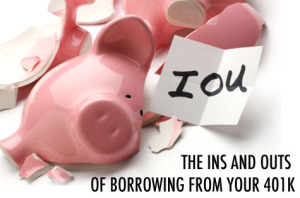 In these challenging economic times, an increasing number of Americans are borrowing money from their qualified plans to bridge the gap between their cash inflows and outflows. In fact, according to HelloWallet.com, more than one in four Americans have done this, using the money to pay mortgage payments, credit card bills, and other expenses. They reported that, of the $294 billion deposited into 401(k) plans by employers and employees in 2012 – 2013, about $70 billion, or 24%, was withdrawn for nonretirement purposes.
In these challenging economic times, an increasing number of Americans are borrowing money from their qualified plans to bridge the gap between their cash inflows and outflows. In fact, according to HelloWallet.com, more than one in four Americans have done this, using the money to pay mortgage payments, credit card bills, and other expenses. They reported that, of the $294 billion deposited into 401(k) plans by employers and employees in 2012 – 2013, about $70 billion, or 24%, was withdrawn for nonretirement purposes.
Borrowing from your 401(k) plan should be your last resort, not your first. Ideally, you would never touch your retirement funds, allowing them to grow continuously until you retire. But we don’t live in an ideal world! We are living through trying times and, for most, options are limited.
While borrowing from your 401(k) plan is allowed by law, employers are not required to allow you to borrow from them. The statutes governing plan loans place no restrictions on what the money can be used for, but an employer can restrict access to plan loans if they disapprove of your reason for needing a loan. Many plans charge origination fees, maintenance fees, or both, all of which go to the plan administrator, not to your account.
The Good – There are several advantages to a 401(k) loan over other types of loans. A plan participant can borrow up to half of their vested balance, or $50,000, whichever is less. There is no credit check, no qualification, other than possibly needing a spouse’s consent, and you may be able to obtain a loan simply by calling your plan’s (800) number, going online, or visiting your benefits office. You may receive the loan in a matter of days and have up to five years to pay the money back. If you borrow from your 401(k) for the purchase of a primary residence, you may have up to 15 years to pay the money back. You can repay the loan faster if you wish with no prepayment penalty.
You pay interest on the amount borrowed – often the “prime rate” plus one or two percentage points. As of this writing the “prime rate” is 3.25%. If the margin is 2.00%, then the interest rate you will pay is 5.25%. Interest proceeds then become part of your account balance. While it is true that you are paying yourself interest, when you borrow money from your account, the amount you borrowed is no longer invested or earning interest from whatever the funds were invested in. Instead, you are paying the interest. For example, if you borrowed $10,000 and you paid yourself 5.25%, your account would earn $525.00. However, if your 401(k) returned 10%, your $10,000 would have earned $1,000. You may be thinking you only lost $475. In reality, you made an extra $475 after-tax contribution to your 401(k) and missed out on the entire $1,000 in earnings.
The Bad – You repay the loan through automatic payroll deduction with after-tax dollars, unlike your contributions, which are pre-tax dollars, plus you interrupt interest compounding because the amount you borrowed is subtracted from the account balance. Additionally, you are taxed twice – once when repaying the loan with after-tax dollars, and a second time when the money is withdrawn at retirement. Another important point is the loan interest is not tax deductible even if you borrowed the money to purchase a primary residence.
 The Ugly – If you leave your job, even if it is not your choice to leave, the outstanding 401(k) loan balance comes due and must be repaid in full within 90 days or the loan balance will be treated as a withdrawal and you will receive an IRS Form 1099 from the plan administrator. You will be charged Federal and State taxes, depending on your State, on the outstanding balance and a 10% penalty if you are under 59 ½ years of age. The same will happen if you default on your 401(k). In rare occasions a plan administrator will allow you to continue making after-tax payments and not report the account balance as a taxable withdrawal. Check with your plan administrator.
The Ugly – If you leave your job, even if it is not your choice to leave, the outstanding 401(k) loan balance comes due and must be repaid in full within 90 days or the loan balance will be treated as a withdrawal and you will receive an IRS Form 1099 from the plan administrator. You will be charged Federal and State taxes, depending on your State, on the outstanding balance and a 10% penalty if you are under 59 ½ years of age. The same will happen if you default on your 401(k). In rare occasions a plan administrator will allow you to continue making after-tax payments and not report the account balance as a taxable withdrawal. Check with your plan administrator.
There are many things to know and consider when deciding whether a 401(k) loan is a good choice for you. If you’re interested in learning more about qualified plans download our FREE report entitled “Is Your IRA/401(k) a Ticking Time Bomb?” We also encourage you to contact us to schedule a time to talk about your specific circumstances.
Leave a Comment